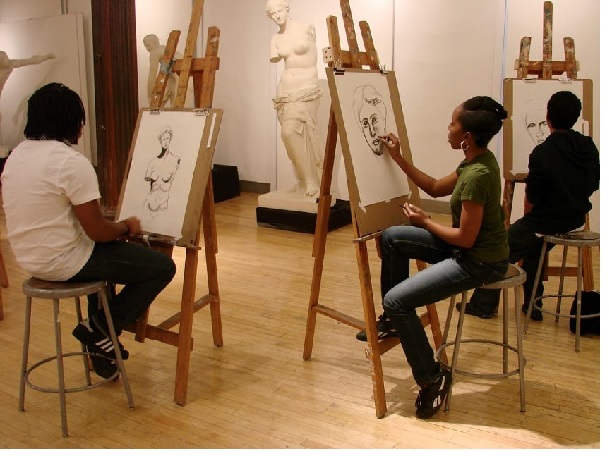Before we go ahead to discuss the 5 easiest art courses to study in Nigeria, let’s establish that what’s easy and difficult is very subjective. It largely depends on your likes and dislikes. For this article, however, the courses we’ll be addressing are those in which students can have a higher-than-average gross point average (GPA). In other words, you’ll find it less difficult to maintain a higher GPA if you studied any of these art courses compared to others. Let’s see what the 5 easiest art courses in Nigeria are.

The 5 easiest art courses in Nigeria would be discussed below:
-
English Language
One of the reasons studying the English Language at the university is easy is because as a Nigerian whose lingua franca is English, you certainly would have been taught the English Language from your nursery school days up to secondary school. And if you enjoy the written and spoken word then you would find it even easier to study English in the university as a passion for a subject makes learning easier. What’s more, a degree in English does not require memorizing complicated formulas nor require additional training.
During your undergraduate programme studying English Language, you’ll gain industry-specific skills like writing techniques, writing style, critically analysing text, advanced grammar and vocabulary, literary works, and articulating knowledge and understanding of text. These skills can be applied to loads of industries and job types, hence a degree in English Language offers strong job prospects in Nigeria.
With a degree in English Language, you can become an editor, author, researcher, public relations specialist, publisher, teacher, lecturer, journalist, technical writer, and much more. Without so much stress in obtaining a degree, the English Language equips graduates with skills that can be applied to virtually every field.
-
Mass Communication
Mass Communication (or Communication Arts in some universities) is among the easiest art courses in Nigeria. If you have average command of verbal and written communication skills and passion, you’ll see that this course is comparatively much easier than other art courses. Mass Communication is a practical-oriented course that is concerned with the study of communicating with the masses, as well as the strategy and purpose of disseminating information to the public.
As a student of Mass Communication in any Nigerian university, you’ll learn how media works and its effect on society; analyse the different forms of media; study the impact of media on culture; learn about media history and law, and; create media projects of your own. The theoretical knowledge and practical skills you’ll gain from studying Mass Communication can be applied to several different fields.
After graduation, you can gain successful work in the continually evolving mass media field, whether it be in the private or public sector. Some possible jobs available to a Mass Communication graduate in Nigeria include but are not limited to columnist, critic, program director, advertising salesperson, media planner, broadcast technician, journalist, and so on.
-
Literature in English
Another art course worthy of a spot in this article is Literature in English. Literature in English is a pretty straightforward course that requires you to analyse, debate, and critically theorise about a large number of published literary works such as poems, novels, and plays. If you studied Literature in English in Secondary School (usually an O’level requirement for this course) and you have a passion for the subject, you’ll find out that studying Literature in English is quite easy, especially if you study hard enough.
A degree in Literature in English will equip you with transferable skills that are highly sought after by employers, such as carrying out research, developing persuasive arguments and producing articulate writing, presentation skill, ability to analyse details. After graduating with a degree in this course, you can work as a journalist, book publisher, editor, teacher, copywriter, and much more.
-
Religious Studies
Religious Studies here means Christian Religious Studies and Islamic Studies. Studying Religious Studies, which is devoted to examining beliefs, institutions, and customs of world religions (Christianity and Islam, in this case) is one of the easiest art classes one could study at the university. As a student of Christian Religious Studies/Islamic Studies, most of your time would be spent reading scriptures and drawing moral conclusions. If you were a practising Christian/Muslim before going to study Religious Studies at the university, you’d not be unfamiliar with most of the concepts you will learn as a student of the aforementioned course.
As a student of Religious Studies, you will not carry out practicals, memorize complicated formulas, and require a great amount of workload. This makes it quite easier to attain academic excellence as maintaining a higher GPA as a student of Religious Studies is less difficult than most art courses. However, the drawback is there are few clear-cut career paths you can explore in Nigeria after completing your degree in Religious Studies. Some possible career paths include being a pastor/Imam, Bible/Koran teacher, religious counselor, and priest.
-
History and International Studies
This is another art course in Nigeria that is comparatively easier to study. Studying History and International Studies at the university will equip you with a thorough understanding of Nigerian history and historiography, as well as educate you on the historical movements of global importance and international forces in the development of Africa. This would provide you with a better knowledge of the world. Furthermore, you’ll learn to appreciate international relations theories and other tools of analysis, and how to apply them to solve international problems.
One of the drawbacks of studying History and International Studies in Nigeria is there is a limited demand for the services of graduates of this course in Nigeria. However, adding a master’s degree in a more marketable course can improve your employability potential.
The art courses we discussed in this article were selected because graduates of these courses were more likely to attain an above-average cumulative gross point average (CGPA) at the completion of their undergraduate programmes than other art courses in Nigeria.